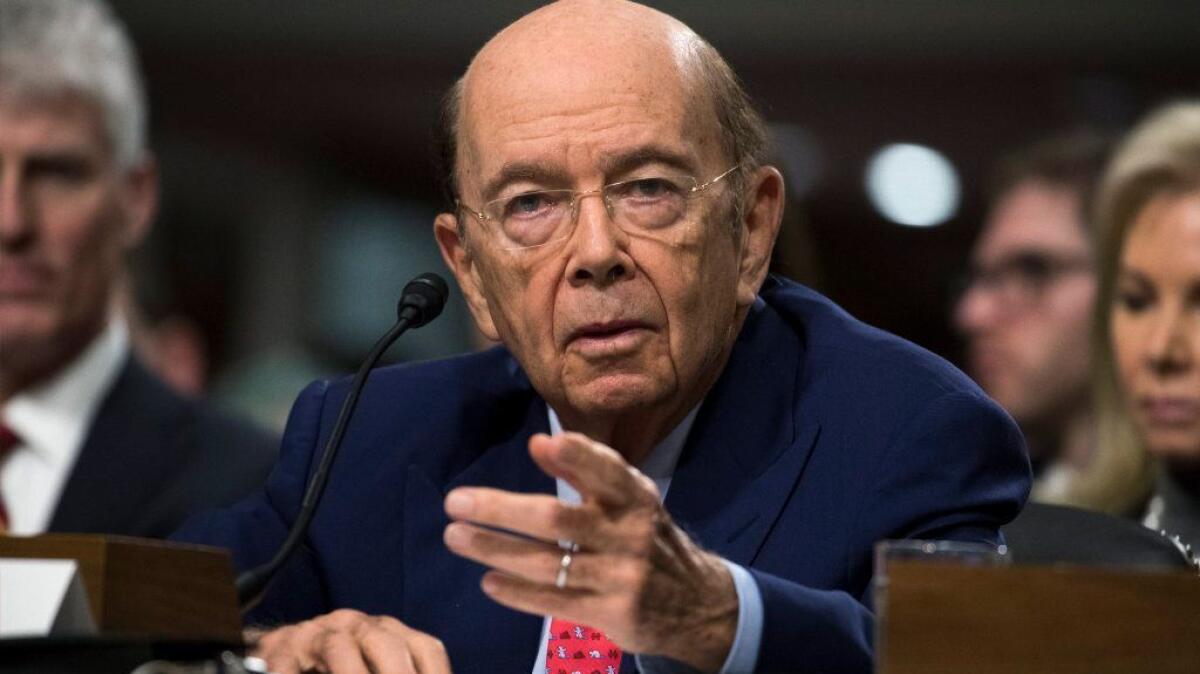Wilbur Ross, to be key player in NAFTA negotiations, confirmed as Commerce secretary

Reporting from Washington — Wilbur Ross, the billionaire investor who will play a leading role in President Trump’s revamping of the North American Free Trade Agreement, easily won Senate confirmation Monday night to be the administration’s Commerce secretary.
Unlike some other Trump nominees who faced intense opposition from Senate Democrats, Ross had a relatively smooth confirmation hearing and cleared the full Senate 72 to 27.
Just before the vote, Sen. Bill Nelson (D-Fla.), the ranking minority member of the Commerce, Science and Transportation Committee, urged fellow lawmakers to vote for Ross, despite what he said was the Trump administration’s refusal to release written answers to questions from Senate Democrats about Ross’s investments in a Cyprus bank with reported financial ties to wealthy Russians.
Nelson said he had talked with Ross twice about the matter and was satisfied with the nominee’s assurances that he had no knowledge of any interaction between the bank and people associated with the Trump administration.
Earlier in the confirmation process, there were questions about Ross’s vast financial holdings and past involvement turning around distressed companies in textile and auto industries, in part by investing in low-cost manufacturing overseas and in Mexico. Trump has blasted such practices for killing American jobs but is now enlisting Ross to help reverse offshoring activities by overhauling trade and other economic policies.
Ross, 79, dealt with concerns about his massive fortune — and the potential conflicts of interest that might raise — by promising to divest most of his assets and step down from positions on multiple companies and foundations. In an agreement with the U.S. Office of Government Ethics, Ross said he would retain interests in a dozen entities engaged in real estate and shipping businesses, although most would not undertake new investments after his confirmation.
Now that Ross is on board, Trump is expected in short order to give the required 90-day notice to Congress for the administration to start renegotiating NAFTA. Ross has said that overhauling the 23-year-old pact with Canada and Mexico would be a top priority.
During his confirmation hearing in January, Ross signaled that his agency also would look at imposing duties on Chinese steel and possibly other goods that have been dumped at unfairly low prices or subsidized by the state.
Ross told lawmakers that he opposed the Trans-Pacific Partnership, the massive 12-nation free-trade deal completed by the Obama administration but never ratified. Trump formally withdrew from the agreement after taking office and has threatened to pull out of NAFTA if the U.S. doesn’t get concessions, particularly from Mexico.
Trump’s often-strident talk on trade has put Republican leaders between a rock and a hard place. The GOP has long been the party of free trade. Ross has taken a more measured tone than Trump, saying that he is pro-trade.
Traditionally the head of the Commerce Department has wielded little power in the White House, but the president has indicated that Ross would be the principal Cabinet official in reshaping NAFTA and other trade deals to protect American industries and jobs.
With Ross’s confirmation, two of three key figures on Trump’s trade team are in place. In December, Trump tapped Peter Navarro, a UC Irvine business professor known for his harsh criticism of China’s trade practices, to head a new White House-based trade council.
The president in early January nominated Robert Lighthizer, a veteran trade lawyer and negotiator who worked in the Reagan administration, to serve as the U.S. trade representative.
Navarro’s appointment did not require Senate confirmation. Lighthizer’s does, but a hearing on his nomination has not yet been scheduled, in part because of delays related to Lighthizer’s past work on behalf of foreign government clients.
Follow me at @dleelatimes
ALSO
Factory CEOs tell Trump: Jobs exist, skilled applicants don’t
Mnuchin says Trump tax overhaul could happen by August
Trump’s promise to ramp up deportations spreads fear — among California businesses
UPDATES:
4:45 p.m.: This article was updated after the Senate vote.
This article was originally published at 1 p.m.
More to Read
Inside the business of entertainment
The Wide Shot brings you news, analysis and insights on everything from streaming wars to production — and what it all means for the future.
You may occasionally receive promotional content from the Los Angeles Times.











